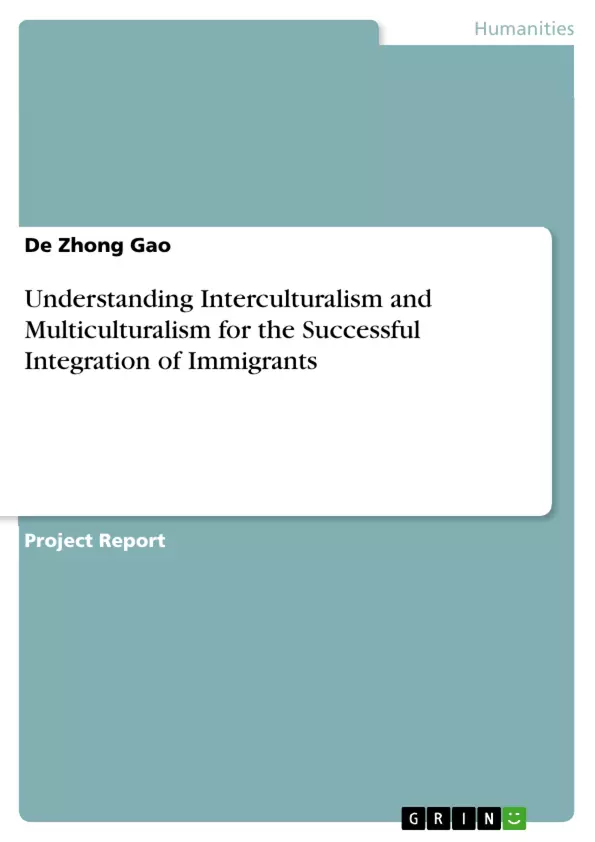Multiculturalism grew straight out of a rejection of “biculturalism” proposed by Liberals in 1963 as a means to protect Québec’s distinct national country in the same country as Anglophones also had been developing a culture of their own. Québec nationalists see multiculturalism as a threat to their unique position within Canada. Sovereignists introduced Bill 101 as their cultural charter and compelled Quebeckers to choose between French and English while sacrificing any distinct and different culture of their own. Québec realized that it needed newcomers even more desperately than other Canadian regions because of its low birth rate. However, welcoming newcomers and integrating them in the Canadian society are another story. Many controversies have arisen over the past few years about the accommodations and integration of immigrants in Québec.
In 2007, Premier Jean Charest appointed the Bouchard-Taylor Commission to inquire about the issue of reasonable accommodations. This essay will present a case-study on Canadian multiculturalism and Québec interculturalism, which the author has undertaken to assess the effectiveness of the Bouchard-Taylor Commission. To do so, I will compare and contrast the achievements of interculturalism with the Canadian federal policy of multiculturalism in helping immigrants integrate in Québec by looking at a series of interviews from English-speaking and French-speaking Canadians and immigrants vis-à-vis multiculturalism and interculturalism.
Table of Contents
- Introduction
- Multiculturalism and Interculturalism in Canada and Quebec
- The Canadian Multiculturalism Policy
- The Bouchard-Taylor Commission
- The Canadian Multiculturalism Policy
- Origins and Development of the Policy
- Arguments in Favour of Multiculturalism
- Criticisms of the Multiculturalism Policy
- Interculturalism in Quebec
- The Rise of Interculturalism in Quebec
- The Bouchard-Taylor Commission: Context and Mandate
- The Role of Religion in Accommodation Debates
- Challenges and Opportunities
- The Hérouxville "Life Standards" Charter
- The Impact of Recent Events on Integration
- Future Directions for Integration in Quebec
Objectives and Key Themes
This essay examines the effectiveness of the Bouchard-Taylor Commission in promoting successful integration of immigrant communities in Quebec. The essay aims to compare and contrast the achievements of interculturalism in Quebec with the Canadian federal policy of multiculturalism. It analyzes the impact of both approaches on the integration of immigrants, drawing upon interviews with English-speaking and French-speaking Canadians and immigrants. Key themes explored in the text include: * **Multiculturalism vs. Interculturalism:** The essay contrasts these two approaches to integration, highlighting their different perspectives and impacts. * **Accommodation and Integration:** It examines the complex relationship between reasonable accommodations for cultural practices and the process of integration. * **Cultural Identity and National Identity:** The essay explores the tension between maintaining cultural identity and fostering a sense of national belonging in a diverse society. * **The Role of Religion:** The text highlights the significance of religious beliefs and practices in the accommodation debate, particularly in the context of the Muslim community. * **Social Cohesion and Diversity:** The essay considers the challenge of maintaining social cohesion in a diverse society without eroding the identity and culture of any particular group.Chapter Summaries
This preview will focus on the main themes and arguments of the essay, but will avoid revealing any major conclusions or spoilers. **Introduction:** This section introduces the topic of multiculturalism and interculturalism in Canada and Quebec, focusing on the controversy surrounding reasonable accommodations for immigrants. It also introduces the Bouchard-Taylor Commission and its mandate to investigate these issues. **The Canadian Multiculturalism Policy:** This section examines the origins and development of the Canadian Multiculturalism Policy, highlighting arguments both for and against the policy's effectiveness. **Interculturalism in Quebec:** This section explores the rise of interculturalism in Quebec, emphasizing the context and mandate of the Bouchard-Taylor Commission. It also examines the role of religion in accommodation debates. **Challenges and Opportunities:** This section delves into the challenges and opportunities faced by Quebec in navigating the integration of immigrants, including the Hérouxville "Life Standards" charter, the impact of recent events on integration, and future directions for integration.Keywords
This essay explores the key concepts of multiculturalism, interculturalism, reasonable accommodations, integration, cultural identity, national identity, and the role of religion in a diverse society. It also examines the experience of immigrants in Canada and Quebec, focusing on the challenges and opportunities they face in navigating the complex landscape of multiculturalism and interculturalism.Frequently Asked Questions
What is the difference between Multiculturalism and Interculturalism?
Multiculturalism (Canadian federal policy) focuses on preserving distinct cultures side-by-side, while Interculturalism (Quebec policy) emphasizes integration into a common French-speaking core while respecting diversity.
What was the Bouchard-Taylor Commission?
It was a commission appointed in 2007 to investigate the issue of "reasonable accommodations" for immigrants in Quebec following several public controversies.
How does Bill 101 affect integration in Quebec?
Bill 101 serves as a cultural charter that mandates the use of French, compelling newcomers to integrate primarily into the Francophone society.
What are "reasonable accommodations"?
They are adjustments made to rules or environments to allow individuals to practice their cultural or religious beliefs without causing undue hardship to the institution.
What role does religion play in the Quebec integration debate?
Religious practices, particularly within the Muslim community, have been at the center of debates regarding secularism (laïcité) and social cohesion in Quebec.
- Citar trabajo
- De Zhong Gao (Autor), 2012, Understanding Interculturalism and Multiculturalism for the Successful Integration of Immigrants, Múnich, GRIN Verlag, https://www.grin.com/document/191923



